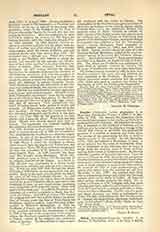

Feuillet (FEUILLEE), LOUIS, geographer, b. at Mane near Forcalquier, France, in 1660; d. at Marseilles in 1732. He entered the Franciscan Order and made rapid progress in his studies, particularly in mathematics and astronomy. He attracted the attention of members of the Academy of Sciences and in 1699 was sent by order of the king on a voyage to the Levant with Cassini to determine the geographical positions of a number of seaports and other cities. The success of the undertaking led him to make a similar journey to the Antilles. He left Marseilles, February 5, 1703, and arrived at Martinique April 11. A severe sickness was the cause of considerable delay, but in September of the following year he began a cruise along the northern coast of South America, making observations at numerous ports. He likewise collected a number of botanical specimens. Upon his return to France in 1706, his work won recognition from the Government, and he immediately began preparations for a more extended voyage along the western coast of South America to continue his observations. He received the title of royal mathematician, and armed with letters from the ministry set sail from Marseilles, December 14, 1707. He rounded Cape Horn after a tempestuous voyage and visited the principal western ports as far north as Callao. At Lima he spent several months studying the region. He returned to France in 1711, bringing with him much valuable data and a collection of botanical specimens. Louis XIV granted him a pension and built an observatory for him at Marseilles. Feuillet was of a gentle and simple character, and while an enthusiastic explorer, was also a true ecclesiastic. He was the author of “Journal des observations physiques, mathematiques, et botaniques” (Paris, 1714); “Suite du Journal” (Paris, 1725).
1887. He belonged to an old family of barristers, and his parents wished him to follow the family traditions. He received his secondary instruction at the lycee of Rennes and studied law at the university of the same city. He was admitted to the bar at the age of nine-teen, but the loss of his first case disgusted him with the practice of law, and he went to Paris, where he secured a position as a bank clerk. His fondness for reading which caused him to neglect his professional duties, led to his dismissal a few months later. He is next found in the service of an advertising concern, then on the staff of an obscure Parisian paper, and finally as proof-reader in the offices of “Le Nouvelliste”. He had already begun to write. A short story, “Le club des Phoques”, which he published in “La Revue de Paris“, in 1841, attracted attention and opened to Feval the columns of the most important Parisian newspapers. In 1844, under the pseudonym of Francis Trolopp, he wrote “Les mysteres de Londres”, which had great success and was translated into several languages. From this time on he hardly ever ceased writing, sometimes publishing as many as four novels at a time. Some of them he also tried to adapt for the stage but, with the exception of “Le Bossu” which was played many times, his ventures in that direction were unsuccessful. Feval’s writings had not always been in conformity with the teachings of the Church. In the early seventies he sincerely returned to his early belief, and between 1877 and 1882 published a revised edition of all his books. He also wrote some new works which show the change. His incessant labor and the financial reverses he had suffered told on his constitution; he was stricken with paralysis. The Societe des Gens de Lettres, of which he was the president, had him placed in the home of Les Freres de S. Jean de Dieu, where he died.
Most of Feval’s novels are romantic; in fact he may be considered as the best imitator of the elder Dumas; his fecundity, his imagination, and his power of interesting the reader rival those of his great predecessor; the style, however, too often betrays the haste in which his novels were written. The list of his works is a very long one.
PIERRE MARIQUE

